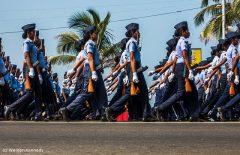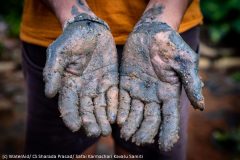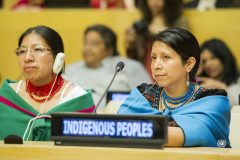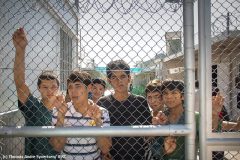Newsletter E-CONNECT No.33 is out
October 22, 2020
On the 22nd of October, we released our new issue of E-CONNECT. If you have not subscribed to our newsletter, you can do it from here! Back number is also available.
![]()
Feature story
Over 500 NGOs call for resumption of country monitoring by UN human rights treaty bodies
 522 organisations from all regions joined the civil society letter to urge the Human Rights Treaty Bodies and the Office of the UN High Commissioner for Human Rights (OHCHR) to schedule State reviews no later than 2021 and communicate clearly to civil society in advance about their up-coming work. The letter expresses concerns on the increasing backlog and protection gap due to the fact that the Treaty Bodies are not reviewing States. It considers that online or hybrid State reviews can be done on a temporary and exceptional basis in the context of the COVID-19 pandemic. The letter was prepared by TB-Net, which IMADR is a founding member, together with Amnesty International and the International Service for Human Rights. More >>
522 organisations from all regions joined the civil society letter to urge the Human Rights Treaty Bodies and the Office of the UN High Commissioner for Human Rights (OHCHR) to schedule State reviews no later than 2021 and communicate clearly to civil society in advance about their up-coming work. The letter expresses concerns on the increasing backlog and protection gap due to the fact that the Treaty Bodies are not reviewing States. It considers that online or hybrid State reviews can be done on a temporary and exceptional basis in the context of the COVID-19 pandemic. The letter was prepared by TB-Net, which IMADR is a founding member, together with Amnesty International and the International Service for Human Rights. More >>
UN Human Rights Council is urged to establish an accountability mechanism on Sri Lanka
 The UN Special Rapporteur on the promotion of truth, justice, reparation and guarantees of non-recurrence submitted a much-awaited report on Sri Lanka to the 45th session of the UN Human Rights Council held in September. At the presentation of his reports, IMADR delivered a joint statement with international and regional human rights NGOs to highlight the series of regressive steps and signs of further backtracking on reconciliation, accountability, and human rights in Sri Lanka, to call upon the Human Rights Council to establish an international accountability mechanism and to urge the Special Rapporteur to closely follow-up on the country situation. More >>
The UN Special Rapporteur on the promotion of truth, justice, reparation and guarantees of non-recurrence submitted a much-awaited report on Sri Lanka to the 45th session of the UN Human Rights Council held in September. At the presentation of his reports, IMADR delivered a joint statement with international and regional human rights NGOs to highlight the series of regressive steps and signs of further backtracking on reconciliation, accountability, and human rights in Sri Lanka, to call upon the Human Rights Council to establish an international accountability mechanism and to urge the Special Rapporteur to closely follow-up on the country situation. More >>
India must strengthen its fight against manual scavenging and protect Dalits
 In response to the follow-up report on India by the UN Special Rapporteur on the human rights to safe drinking water and sanitation, IMADR delivered a statement at the 45th session of the UN Human Rights Council. The statement, supported by the International Dalit Solidarity Network, highlights the remaining challenge to eradicate the practice of manual scavenging which Dalits, especially Dalit women, are disproportionately affected by. The statement points out that manual scavengers are dangerously exposed to COVID-19 by cleaning medical and virus-affected waste without any safety equipment. More >>
In response to the follow-up report on India by the UN Special Rapporteur on the human rights to safe drinking water and sanitation, IMADR delivered a statement at the 45th session of the UN Human Rights Council. The statement, supported by the International Dalit Solidarity Network, highlights the remaining challenge to eradicate the practice of manual scavenging which Dalits, especially Dalit women, are disproportionately affected by. The statement points out that manual scavengers are dangerously exposed to COVID-19 by cleaning medical and virus-affected waste without any safety equipment. More >>
IMADR in the world
 Webinar: “Racism and domestic law” in East Asia (27 October 2020)
Webinar: “Racism and domestic law” in East Asia (27 October 2020)
The Organising Committee for East Asia regional consultation invites you to the 3rd webinar of the online series on Racism in East Asia – “Racism and domestic law” on 27 October 2020 at 16h00–17h30 (ROK/JPN)/ 15h00–16h30 (HK). More >>
IMADR and its concerns
 Reprisals against indigenous human rights defenders
Reprisals against indigenous human rights defenders
At the annual panel discussion on the rights of indigenous peoples of the UN Human Rights Council, IMADR raised concerns on reprisals against indigenous human rights defenders for cooperating with the UN human rights bodies as seen in the case of indigenous representatives from Russia who engaged with the Committee on the Elimination of Racial Discrimination (CERD) in 2017. More >>
IMADR at the UN
 CERD holds 102nd session online
CERD holds 102nd session online
UN Committee on the Elimination of Racial Discrimination (CERD) will hold its 102nd session online in November. The Committee will consider the follow-up reports of Cuba, Guatemala, Kyrgyzstan, Montenegro and the Republic of Korea, and adopt a list of issues prior to reporting (LOIPR) on Guyana, Monaco and Tunisia. More >>
Publication
 Submission: Inputs on the prohibition of racial discrimination in immigration detention
Submission: Inputs on the prohibition of racial discrimination in immigration detention
In response to the UN Committee on Migrant Workers’ call for comments on its draft General Comment No.5 on migrants’ rights to liberty and freedom from arbitrary detention, IMADR submitted inputs on the need to collect disaggregated data on the population of immigration detention facilities to combat racially discriminatory treatments of migrants. More >>
Related Content

Newsletter E-CONNECT No.40 is out

Newsletter E-CONNECT No.39 is out

Newsletter E-CONNECT No.38 is out


